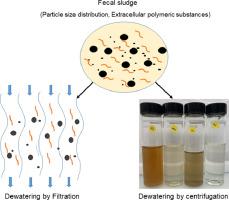Water Research ( IF 11.4 ) Pub Date : 2022-07-28 , DOI: 10.1016/j.watres.2022.118915 Stanley B Sam 1 , Barbara J Ward 1 , Robert Niederdorfer 2 , Eberhard Morgenroth 1 , Linda Strande 2

|
As the importance of fecal sludge management (FSM) is increasingly being realized, the need for adequately designed and functioning fecal sludge (FS) treatment plants is also increasing. Research to fill this gap is only emerging and dewatering is a key challenge for developing sustainable treatment solutions. This study evaluated the effect of extracellular polymeric substances (EPS) on dewaterability of FS, and how EPS and dewaterability change during anaerobic storage (as a proxy for time in onsite containment). EPS was extracted from FS and activated sludge using Na2CO3 and sonication and added to sludge samples to determine the effect on dewaterability. The results confirmed that an increase in EPS had a direct impact of decreasing FS dewaterability (as capillary suction time). In this context, we evaluated FS degradation during anaerobic storage, the effect of anaerobic storage time on EPS, EPS fractions and particle size distribution, and the effect of variations in these factors on FS dewaterability. Variations in EPS, EPS fraction and particle size distribution during anaerobic storage were less than expected and average VS reduction of 20% was recorded over 7 weeks. Although anaerobic digestion was verified (biogas production), the results indicate that kinetics of degradation of FS is different from wastewater sludges. Comparatively, EPS fractions in FS were 70 – 75% lower and with higher fractions of humic-like substances than wastewater sludges. Although EPS significantly affects FS dewaterability, anaerobic storage time is not a predictor of dewaterability.
中文翻译:

阐明细胞外聚合物 (EPS) 在现场卫生系统粪便污泥脱水性中的作用,以及厌氧储存过程中的变化。
随着粪便污泥管理 (FSM) 的重要性日益凸显,对设计合理、功能完善的粪便污泥 (FS) 处理厂的需求也在增加。填补这一空白的研究才刚刚兴起,脱水是开发可持续处理解决方案的关键挑战。本研究评估了细胞外聚合物 (EPS) 对 FS 脱水性的影响,以及厌氧储存期间 EPS 和脱水性如何变化(作为现场密封时间的代表)。使用 Na 2 CO 3从 FS 和活性污泥中提取 EPS和超声处理并添加到污泥样品中以确定对脱水性的影响。结果证实,EPS 的增加直接影响 FS 脱水性(如毛细管抽吸时间)的降低。在此背景下,我们评估了 FS 在厌氧储存期间的降解、厌氧储存时间对 EPS、EPS 分数和粒度分布的影响,以及这些因素的变化对 FS 脱水性的影响。厌氧储存期间 EPS、EPS 分数和粒度分布的变化小于预期,7 周内平均 VS 减少了 20%。尽管证实了厌氧消化(沼气生产),但结果表明 FS 的降解动力学与废水污泥不同。比较,FS 中的 EPS 分数比废水污泥低 70 – 75%,腐殖质类物质的分数更高。尽管 EPS 显着影响 FS 脱水性,但厌氧储存时间并不是脱水性的预测指标。









































 京公网安备 11010802027423号
京公网安备 11010802027423号